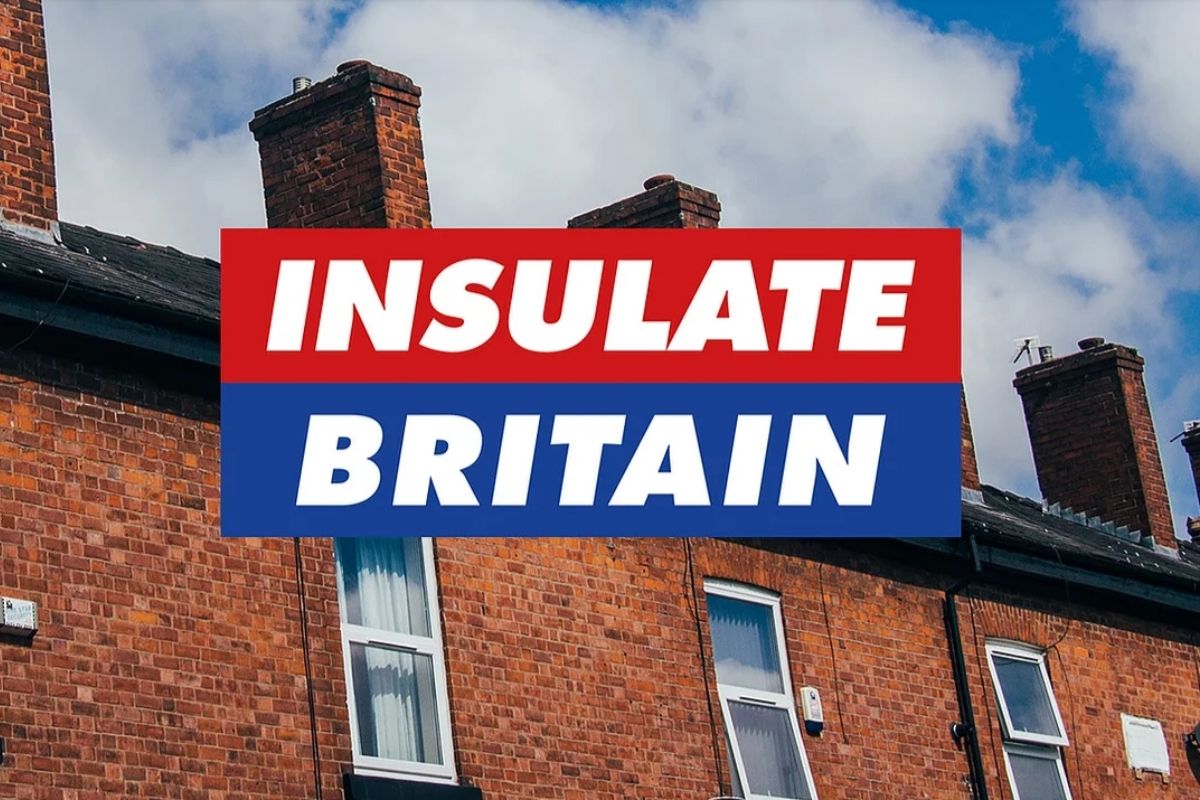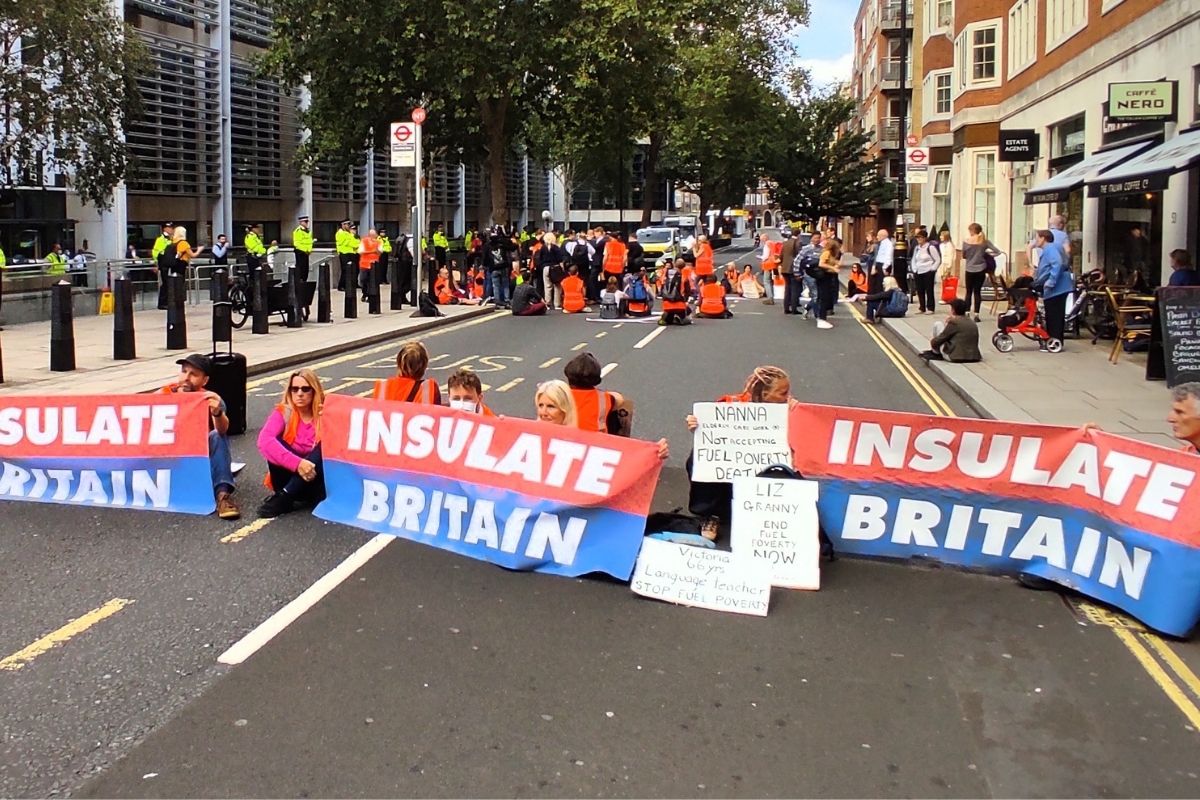Environmental activist group Insulate Britain have hit the news recently with their disruptive protests, pressuring the government to take bold action to save the climate. To fight for real change, we need mass action and socialist policies.
Insulate Britain – a climate activist group formed in July 2021 as an offshoot of Extinction Rebellion – have been making headlines since mid-September for their controversial brand of direct action.
The group has blocked major motorways, slip roads, and tunnels at various points throughout London and the surrounding commuter belt, leading to the arrest of hundreds of activists.
Earlier this week, for example, activists targeted junctions in the financial districts of Canary Wharf and the City of London.
Aims

Insulate Britain aims to put pressure on the government to adopt a legally-binding plan to properly insulate all social housing by 2025, and to retrofit all other housing by 2030.
Poorly-insulated homes are a leading cause of fuel poverty, and a key contributing factor towards increasing energy use and carbon emissions.
According to the Construction Leadership Council, homes use 35% of all energy consumed in the UK, making them the biggest source of energy consumption aside from transport.
The demands of the group echo those made by Greenpeace and others in an open letter last year; the bare minimum that would be required for the UK to successfully slash its emissions.
The UK Climate Change Committee has stated that the government has failed to “drive either the scale or pace of change needed” with regards to building new energy efficient homes and supporting efforts for retrofitting. Instead, the Tories have scrapped the Green Homes Grant and the Zero Carbon Homes initiative.
Tactics
As it stands, Britain’s homes are unfit to face the challenges of climate change. And, as ever under capitalism, it is the least well off who will suffer the consequences.
This point has been hammered home in recent weeks, with energy companies going bust, and taxpayers facing the prospect of bailouts or blackouts.
The question is, therefore, how do we successfully achieve this transformation of the UK’s housing stock? This is no small challenge, given that Britain has 29 million residential homes, and some of the poorest levels of insulation in Europe. And time is of the essence.
The tactics of Insulate Britain follow those of XR, with attempts to be as disruptive as possible. The group’s organisers rationalise that, since many successful social movements have been disruptive, this – in and of itself – is key to a movement’s success.
Insulate Britain protesters glued to Southwark Bridge this morning. pic.twitter.com/TB1rFAFZg6
— Theo Whyte (@TJAWhyte) October 25, 2021
But ‘disruption’ by itself is not the key characteristic of the most powerful movements throughout history. Rather, what is needed is to connect with the widespread mood of discontent in society, and organise mass action that raises consciousness and points a clear way forward.
Profit

In order to understand how to fight for climate action effectively, we must first be clear why this is happening in the first place.
Insulate Britain appeals to the government, urging Boris Johnson to “do the right thing” as COP26 approaches. But we cannot rely on the conscience of the Tories to solve the climate crisis.
For starters, since Johnson became Prime Minister, the Tory Party has received £18 million in donations from sources with ties to the property sector, accounting for around a quarter of all their donations.
The problem goes beyond Tory corruption and cronyism, however. What we are witnessing is yet another failure of the market; another example of the limits of the capitalist system, based on production for profit.
Housing construction is a profitable business. Parasitic developers can make margins of anywhere up to 20-25% on projects, with ordinary people paying the price.
It is estimated, for example, that it costs around £4,800 extra to build a home with proper insulation and a heat pump, instead of a gas boiler. However, people who buy newly-built housing face a bill of more than £20,000 to retrofit these features in line with regulations.
At the same time, it has been well documented that profit-seeking housing developers cut corners and rush construction, in order to reduce costs and get houses on the market as quickly as possible. This leads to substandard insulation that can just about pass the legal requirements, but which is not fit for purpose in the long term.
In summary, the compulsion of the profit motive incentivises developers to prioritise short-term gain over long-term sustainability, passing the costs onto occupants at every opportunity.
Class
Insulation is not the only housing problem faced by ordinary people. A recent survey by housing charity Shelter found that one-in-five private renters have physical or mental health problems caused by their accomodation – mostly caused by cold, mould, and damp.
Many more face the choice between heating and eating, with 26% of adult renters saying they cannot adequately heat their homes in the winter. Over the last five years an estimated 57,000 people have died in the UK due to cold housing conditions. And these problems are only likely to get worse, as Britain’s energy industry descends in chaos and crisis.
We must be clear: the root cause of the country’s deficient housing stock is capitalism – a system based on profit, competition, and the anarchy of the market. The fight for quality homes, therefore, is not just an environmental question but a class question; a question of ownership, control, and planning.
As long as the construction and provision of housing remains in the hands of the capitalists – built for speculators, investors, and landlords as just another commodity to be bought, sold, and rented out at the highest price – there will never be safe, warm housing for everyone.
We cannot rely on the Tories choosing to ‘do the right thing’. This criminal government exists to represent and defend the interests of big business, including the major private property developers and landlords. And unfortunately a small group – or even a large group – of protestors blocking traffic will not be sufficient to alter this allegiance.
Socialism

Instead of appealing to capitalist politicians through small-scale disruptive protests, which in any case mainly affect and alienate ordinary commuters, environmental activists must turn towards the organised working class.
To bring about the necessary changes to housing, transport, and infrastructure requires that these sectors be taken out of private hands, and put under public ownership and workers’ control, as part of a rational, democratic, socialist economic plan.
This means abolishing landlordism, bringing the major housing management companies under public ownership and control, and nationalising the big banks and construction firms, without compensation, in order to implement a mass social housing programme – building homes for need, not profit.
The only way to achieve this is through united class struggle, not individual acts of disruption.
On this basis, by linking environmental struggles with those of workers in relevant industries, we can achieve the demands of Insulate Britain and go much further – mobilising our collective strength to fight for a sustainable, socialist transformation of society, in the interests of people and the planet.






